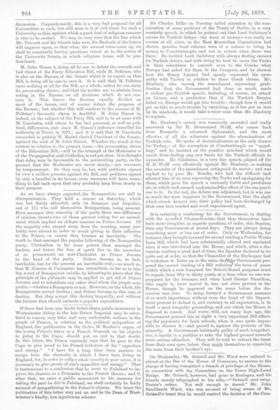If there had, been any doubt before that a public
monument in Westminster Abbey to the late Prince Imperial may be calcu- lated to convey very false and very undesirable notions to the people of France, in relation to the political sympathies of England, the publication in the Ordre, M. Rouher's organ, of the young Prince's letter to a French General, on his objects in going to the Cape, should put an end to that doubt. In this letter, the Prince expressly says that he goes to the Cape to give proof to his French followers of his "capacities and energy." "I have for a long time been anxious to escape from the obscurity in which I have been living in England, for, in order to rally a whole country to your cause, it is necessary to give proofs of one's capacities and energy." That is tantamount to a confession that he went to Zululand to im- prove his chances as a Pretender to the French throne ; and if, after that, we raise a public monument to his memory for taking the part he did in Zululand, we shall certainly be fairly accused of sympathising in the Prince's objects. We trust the publication of this letter may put an end to the Dean of West- minster's kindly, but injudicious scheme. Sir Charles Dilke on Tuesday called attention to the non- execution of some portions of the Treaty of Berlin, in a very masterly speech, in which he pointed out that Lord Salisbury's excuse for Turkish delays—the want of money—was really no excuse at all, since, as the East lac:alma= Commission had shown, genuine local reforms were of a nature to bring in money to Constantinople, and not to reduce what there was there. He twitted Lord Salisbury with always finding excuses for Turkish delays, and with doing his best to cover the Turks in their reluctance to concede even to the Greeks what Europe had asked for them in the Congress, and he showed how Sir Henry Ltiyard had openly expressed his um. pathy with Turkey in relation to these Greek claims. Mr. Hanbury, who moveci, the amendment expressing grati- fication that the Government had done so much, made a violent pro-Turkish speech, including, of course, an attack on Greece, and a prediction that if the Turkish Empire failed us, Europe would get into trouble ; though how it would get us into so much trouble by vanishing, as it has got us into by its misdeeds, it would take a wiser man than Mr. Hanbury to explain.


































 Previous page
Previous page